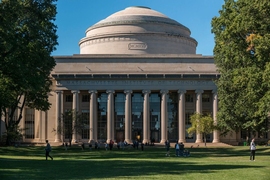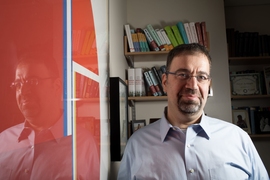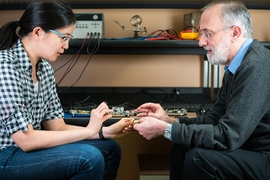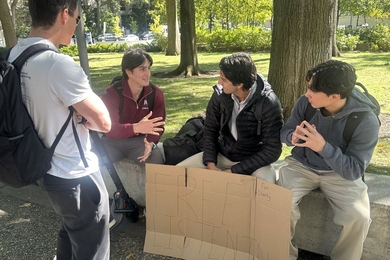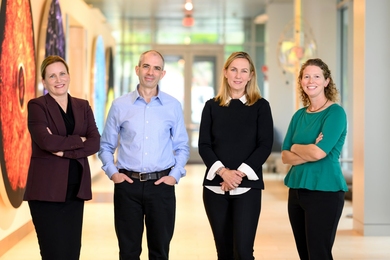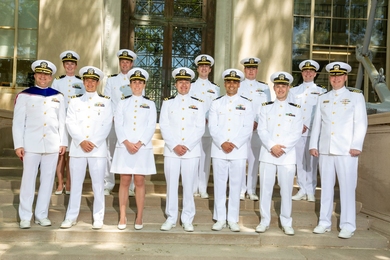In the weeks before the launch of the MIT Intelligence Quest, an initiative that will advance the science and engineering of human and machine intelligence, School of Engineering graduates were asked: “What positive role can MIT play in the AI revolution?”
Alumni urged MIT to energize the artificial intelligence community, including people in industry, academia, and the government, around a thoughtful strategy for the future. They wrote directly to Anantha P. Chandrakasan, dean of engineering and the Vannevar Bush Professor of Electrical Engineering and Computer Science, who posed the question in a monthly newsletter, The Infinite.
“The AI community is struggling to ensure that AI-inspired transformations end up benefiting science and society,” says Auroop Ganguly PhD ’02, a professor of civil and environmental engineering at Northeastern University. “A clear lack of leadership is becoming apparent, particularly in this country, across not just government agencies and labs, but also in academia and private-public sectors. This is an area where MIT, with its enormous resources and reputation, can help jump-start innovations.”
AI-inspired technologies hold great promise, wrote alumni. Smart vehicles may save lives worldwide and smart buildings save energy and reduce carbon emissions. The latest advances are inspiring progress in health care, education, energy, and the environment.
But decisive leadership is essential to guarantee that development of AI technologies includes consideration of societal and ethical questions alongside the technical, say alumni.
“Recent developments ranging from autonomous cars and infrastructural resilience to weather prediction and remote sensing suggest the possibilities that AI can bring to bear in these areas,” says Ganguly. “Private industry may be willing to invest once academia, led by MIT, moves in this direction, as may be evident from signals coming out of technology companies,” he says, noting Microsoft’s AI for Earth initiative and Google’s stated desire to use AI to address humanity’s greatest challenges.
MIT alumnus Tom Wylonis SM ’68 who is board chairman of Evaxion Biotech, which is using AI to seek solutions to global challenges to human health, wrote: “Since industry investments tend to be short-term due to risk aversion, MIT should also lead the way with fundamental research that lays the foundation for longer-term benefits from AI.”
Wylonis, an active mentor to MIT students and funding board member of Sandbox, an Institute-wide program that supports student-initiated ideas, suggests MIT has another leadership role to play.
“I believe that MIT should do all it can to increase the number and quality of MIT graduates with AI specialization,” says Wylonis, citing a rise in AI investment in nearly all industrial sectors. “Along with this, encourage other educational and research institutes to follow suit since we are likely to encounter a massive future shortage of AI talent.”
Alumni repeatedly circled back to the issue of ethical deployment of AI technologies. “MIT can amplify the positive impact of AI by actively encouraging a dialogue between technologists and social scientists on where AI can and should impact society,” wrote Don Shobrys ’75, an engineer and consultant who has volunteered extensively at MIT, including stints serving on the Corporation, as president of the Alumni Association, and as co-director of the Venture Mentoring Service.
Yu Chen ’00, a technical program manager at Google, advised: “MIT will be one of the technology leaders defining the future, so I want us to be mindful about designing a future that works for everyone, not just those who have more access to money or resources or information.”
Many alumni also suggested MIT must help set the agenda for public debate and convene conversations about important issues. Offering people clarity about the role and workings of AI is crucial, they say.
Ray Stata ’57, SM ’58 a longtime MIT volunteer and benefactor, wrote: “MIT is already well-along in AI education and research. But for the alumni it would be great to offer an online course which describes the basics of neural networks and how deep learning is applied to solve problems in new ways.”
Joanna Bryson ScD ’01 an associate professor focused on AI ethics at the University of Bath, declared: “MIT needs to take a strong stand on fact-based assessment of AI.” She added: “MIT needs to claim the high ground and maintain a human-centered perspective on AI.”

